LAURYN HILL / “Every Ghetto, Every City”
The Random House dictionary defines nostalgia as “a wistful desire to return in thought or in fact to a former time in one's life, to one's home or homeland, or to one's family and friends; a sentimental yearning for the happiness of a former place or time.” Take a close listen to Stevie Wonder’s “I Wish” and it’s as if Stevie wrote the record with the definition in mind.
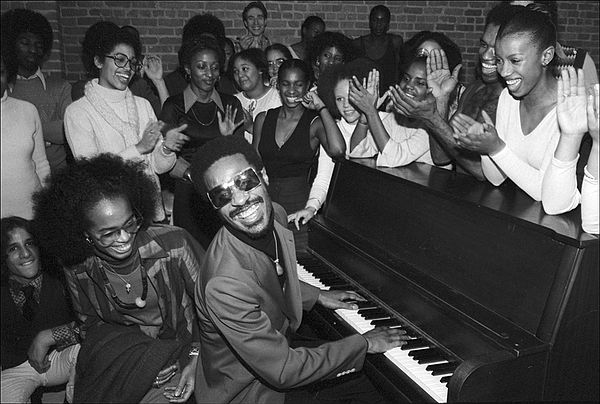 Certainly, there were nostalgic records before “I Wish,” but Stevie’s record set a new standard and in the process created, or at least publicly acknowledged, a new type of nostalgia. Stevie’s nostalgia wasn’t a general homesickness and it wasn’t a vague feeling of wishing he could be young again. Stevie’s nostalgia was more specific than that. It was the nostalgia of black man who’d achieved every ghetto child’s dream of making it out, yet paradoxically found himself wishing that he could be right back in the same place and time from which he’d worked so hard to leave.
Of course, one doesn’t have to be black, famous or from the ghetto to understand Stevie’s sentiments. After all, the song was a major hit on both pop & R&B radio back when it was first released and it remains popular across various demographic lines today, more than thirty years later. The universal appeal of “I Wish” can’t be denied. But the song also includes specific cues, examples and descriptions that are instantly recognizable to those of us who do happen to be black and who did happen to grow up in the ghetto.
Over the years, Stevie’s record has become a model for similar songs. Modern-day singers and rappers follow Stevie’s example in both style and content, fashioning their own nostalgic remembrances of their own days of old. If it sounds at times like the newer songs are near-rewrites of “I Wish,” it’s because “I Wish” itself has become an object of nostalgia. When adults of my generation recall growing up in the ghetto, “I Wish” is part of their mental soundtrack.
Certainly, there were nostalgic records before “I Wish,” but Stevie’s record set a new standard and in the process created, or at least publicly acknowledged, a new type of nostalgia. Stevie’s nostalgia wasn’t a general homesickness and it wasn’t a vague feeling of wishing he could be young again. Stevie’s nostalgia was more specific than that. It was the nostalgia of black man who’d achieved every ghetto child’s dream of making it out, yet paradoxically found himself wishing that he could be right back in the same place and time from which he’d worked so hard to leave.
Of course, one doesn’t have to be black, famous or from the ghetto to understand Stevie’s sentiments. After all, the song was a major hit on both pop & R&B radio back when it was first released and it remains popular across various demographic lines today, more than thirty years later. The universal appeal of “I Wish” can’t be denied. But the song also includes specific cues, examples and descriptions that are instantly recognizable to those of us who do happen to be black and who did happen to grow up in the ghetto.
Over the years, Stevie’s record has become a model for similar songs. Modern-day singers and rappers follow Stevie’s example in both style and content, fashioning their own nostalgic remembrances of their own days of old. If it sounds at times like the newer songs are near-rewrites of “I Wish,” it’s because “I Wish” itself has become an object of nostalgia. When adults of my generation recall growing up in the ghetto, “I Wish” is part of their mental soundtrack.
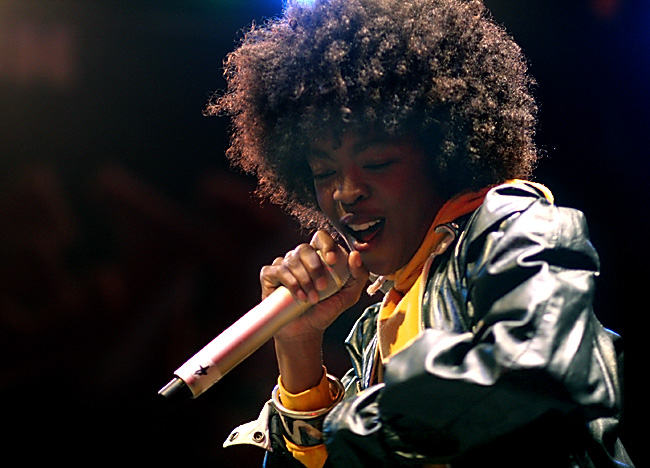 The first “I Wish” record I remember hearing is Lauryn Hill’s “Every Ghetto, Every City.” The chorus of “Looking back / looking back / looking back” is a conscious nod to the opening words of “I Wish,” as is Lauryn’s description of herself as a little girl.
Lauryn from “Every Ghetto”:
The first “I Wish” record I remember hearing is Lauryn Hill’s “Every Ghetto, Every City.” The chorus of “Looking back / looking back / looking back” is a conscious nod to the opening words of “I Wish,” as is Lauryn’s description of herself as a little girl.
Lauryn from “Every Ghetto”:
I was just a little girl Skinny legs and press and curl My mama always thought I’d be a star…Stevie from “I Wish”:
Looking back on when I Was a little nappy-headed boy Then my only worry Was for Christmas what would be my toy…With Stevie’s words in mind, Lauryn is recalling the days before she was supermodel pretty, world famous and monetarily fortunate…and, let’s not forget, saddled with all the complications that come along with such ‘good’ fortune. Using the same descriptive, list-like structure that Stevie used for “I Wish,” Lauryn waxes nostalgic for the food (twenty-five cent bags of candy, Springfield Avenue popsicles, Jamaican beef patties and coco bread), music (Doug E. Fresh & Slick Rick, “Self Destruction,” “Jack Your Body,” Biz Markie) and fun childhood activities (dance classes, foot races in the streets, riding bikes, doing the whop) of her younger days in ‘New Jerusalem’ AKA South Orange, New Jersey.
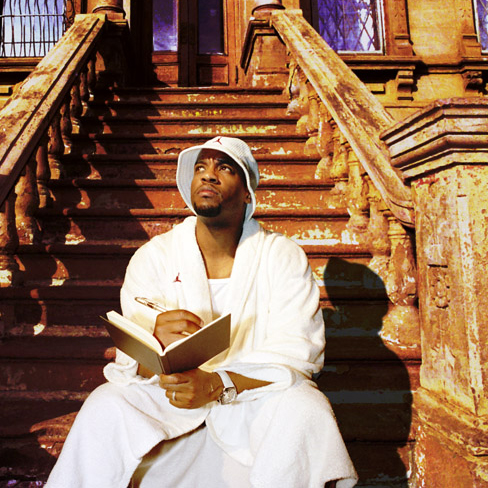 Staying with hip-hop for a minute, we get Masta Ace’s “Survival,” a record so suffused with nostalgia that the chorus features a snippet of vocals sped up to sound like children’s voices while the beat could’ve been sampled from an ice cream truck. Self-deprecation is a virtual obligation of “I Wish” records and in his opening lines Ace obliges, remembering how he used to spend his summers dirt-fighting with his friends and “running through the streets smelly.” And about his teenage years, Ace recalls that he “couldn’t get the shit that some got,” because he “didn’t sell crack rock” nor did he have “a wicked jump shot.” Instead, he got a summer job “sweeping and mopping.” But if you listen between the lines, you’ll realize that all of Ace’s manual labor eventually led to his being able to purchase music equipment and to a successful career doing something he loves. And just as Lauryn cautions near the end of “Every Ghetto,” “Don’t forget what you’ve got,” Ace ends “Survival” with, “Don’t ever forget how it was without.”
Ace’s words make me think of a book I’m currently reading called The How of Happiness, in which the author, Sonja Lyubomirsky, attempts to give the reader measurable, proven methods of increasing their daily and long-term happiness. Throughout the book, Sonja talks about the concept of gratitude and the power of positive, optimistic thinking. “Gratitude,” Sonja says, “is an antidote to negative emotions, a neutralizer of envy, avarice, hostility, worry and irritation.” Songs like “Every Ghetto” and “Survival” are not only about nostalgia for the pleasures of the past, they’re also about gratitude for the blessings of the present – no wonder I feel happier when I hear them.
The author also talks about nostalgia. I’ve usually thought of nostalgia as a bittersweet emotion, at best. Sometimes, I’ve even thought of it as a negative emotion – one that can cause the nostalgic person to feel worse because their present days don’t and can’t measure up to the fun, innocence and general gloriousness of the olden days. But via years of research, interviewing and studying “happy” people (and Sonja defines happy people simply as those who consider themselves happy), Sonja concludes that nostalgia “is actually a positive emotion, albeit a poignant one.” The How of Happiness helps explain why songs like “I Wish” make people feel so good.
Staying with hip-hop for a minute, we get Masta Ace’s “Survival,” a record so suffused with nostalgia that the chorus features a snippet of vocals sped up to sound like children’s voices while the beat could’ve been sampled from an ice cream truck. Self-deprecation is a virtual obligation of “I Wish” records and in his opening lines Ace obliges, remembering how he used to spend his summers dirt-fighting with his friends and “running through the streets smelly.” And about his teenage years, Ace recalls that he “couldn’t get the shit that some got,” because he “didn’t sell crack rock” nor did he have “a wicked jump shot.” Instead, he got a summer job “sweeping and mopping.” But if you listen between the lines, you’ll realize that all of Ace’s manual labor eventually led to his being able to purchase music equipment and to a successful career doing something he loves. And just as Lauryn cautions near the end of “Every Ghetto,” “Don’t forget what you’ve got,” Ace ends “Survival” with, “Don’t ever forget how it was without.”
Ace’s words make me think of a book I’m currently reading called The How of Happiness, in which the author, Sonja Lyubomirsky, attempts to give the reader measurable, proven methods of increasing their daily and long-term happiness. Throughout the book, Sonja talks about the concept of gratitude and the power of positive, optimistic thinking. “Gratitude,” Sonja says, “is an antidote to negative emotions, a neutralizer of envy, avarice, hostility, worry and irritation.” Songs like “Every Ghetto” and “Survival” are not only about nostalgia for the pleasures of the past, they’re also about gratitude for the blessings of the present – no wonder I feel happier when I hear them.
The author also talks about nostalgia. I’ve usually thought of nostalgia as a bittersweet emotion, at best. Sometimes, I’ve even thought of it as a negative emotion – one that can cause the nostalgic person to feel worse because their present days don’t and can’t measure up to the fun, innocence and general gloriousness of the olden days. But via years of research, interviewing and studying “happy” people (and Sonja defines happy people simply as those who consider themselves happy), Sonja concludes that nostalgia “is actually a positive emotion, albeit a poignant one.” The How of Happiness helps explain why songs like “I Wish” make people feel so good.
 Mos Def’s “Habitat” is another hip-hop record that fits the bill. It’s got the same uptempo, danceable feel as the others, the same nostalgic tone and the same descriptive style of lyrics. Listen to Mos talk about his younger days in Brooklyn and you get the feeling that he, Ace and Lauryn could’ve grown up on the same block:
Mos Def’s “Habitat” is another hip-hop record that fits the bill. It’s got the same uptempo, danceable feel as the others, the same nostalgic tone and the same descriptive style of lyrics. Listen to Mos talk about his younger days in Brooklyn and you get the feeling that he, Ace and Lauryn could’ve grown up on the same block:
When I think of home, my remembrance of my beginning Laundromat, helping Ma Dukes fold the bed linen Chillin’ in front my building with my brother and them Spending nights in Bushwick with my cousins and them Wild Style and Beat Street / Federal relief Slowly melting in the morning grits we used to eat Sticking to your teeth and teeth is hard to keep With every flavor Now & Later only a dime apieceSo far, we’ve talked about a soul legend from Detroit and three MCs from the East Coast. Now let’s had some global flavor to our theme. Two young Afro-European singers that Kalamu likes have done their own “I Wish” records. (And at different times over the last couple of years, Kalamu has posted both songs.)
 Straight out of Berlin, Germany, Joy Denalane’s “Born & Raised” describes memories such as “playing dodgeball up against the Berlin Wall” and hanging out with black GIs. While I can’t relate to that at all, Joy’s remembrances of sporting Adidas sneakers, listening to Public Enemy LPs and leaving home for good at the age of sixteen could be taken straight out of my life. Again, you can hear Stevie’s spirit and style in the grooves of Joy’s tune.
Straight out of Berlin, Germany, Joy Denalane’s “Born & Raised” describes memories such as “playing dodgeball up against the Berlin Wall” and hanging out with black GIs. While I can’t relate to that at all, Joy’s remembrances of sporting Adidas sneakers, listening to Public Enemy LPs and leaving home for good at the age of sixteen could be taken straight out of my life. Again, you can hear Stevie’s spirit and style in the grooves of Joy’s tune.
 West Yorkshire (England) native Corinne Bailey Rae uses some of Stevie’s “I Wish” vibe to spice up her nostalgic love song “I’d Like To.” Lying in bed with her man, Corinne tells stories about a smiling neighbor bouncing a baby on her knee, a friend named Rhea sitting on the front step “getting her hair combed out and greased” and street parties where she used to drink rum and punch from plastic cups and eat chicken “hot and sweet.” This song is a fine example of nostalgia being used for a positive purpose. What better time is there to reminisce about the good ol’ days than when you’re with somebody you love?
Other than what’s actually on these records, I don’t know anything about growing up in either Germany or the UK – I’ve never been to either country and it’ll probably be a while before I finally do go – but as I listen to Joy and Corinne do their thing, I find myself comparing their words to those of Ace and Lauryn, and of course to Stevie’s too. Listening to all of these songs, it occurs to me that some feelings must be universal. There must be something in us all that misses the way things used to be (or at least, misses the way we remember things being).
West Yorkshire (England) native Corinne Bailey Rae uses some of Stevie’s “I Wish” vibe to spice up her nostalgic love song “I’d Like To.” Lying in bed with her man, Corinne tells stories about a smiling neighbor bouncing a baby on her knee, a friend named Rhea sitting on the front step “getting her hair combed out and greased” and street parties where she used to drink rum and punch from plastic cups and eat chicken “hot and sweet.” This song is a fine example of nostalgia being used for a positive purpose. What better time is there to reminisce about the good ol’ days than when you’re with somebody you love?
Other than what’s actually on these records, I don’t know anything about growing up in either Germany or the UK – I’ve never been to either country and it’ll probably be a while before I finally do go – but as I listen to Joy and Corinne do their thing, I find myself comparing their words to those of Ace and Lauryn, and of course to Stevie’s too. Listening to all of these songs, it occurs to me that some feelings must be universal. There must be something in us all that misses the way things used to be (or at least, misses the way we remember things being).
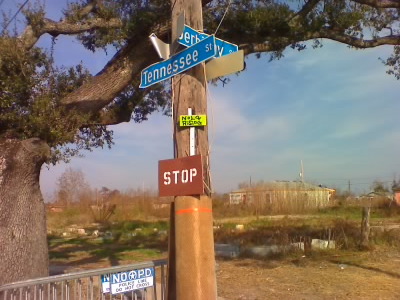 Just the other day, I was downloading pictures from my cellphone of my last trip to New Orleans and I came across a picture I didn’t remember taking. It was the street sign from the corner next to the little house I grew up in. The house is gone now, courtesy of Ms. Katrina. On the concrete slab where the house used to be, there sits one of Brad Pitt’s geometrical light structures that he put up to represent families driven out by the storm. The street signs reads ‘Tennessee’ and ‘Derbigny.’ Unless you happen to be from my block of the Lower Nine in New Orleans, the sign won’t mean anything to you. Just looking at the picture though, I know why Lauryn, Ace, Joy and Corinne wrote their tributes to Stevie. Sometimes I wish those days could come back too.
Take a trip down memory lane:
- Stevie Wonder’s “I Wish” – From Songs In The Key Of Life (Tamla/Motown, 1976)
- Lauryn Hill’s “Every Ghetto, Every City” – From The Miseducation Of Lauryn Hill (Ruffhouse/Columbia, 1998)
- Masta Ace’s “Survival” – From Hits U Missed, Vol. 2 (Promo Only, 2005)
- Mos Def’s “Habitat” – From Black On Both Sides (Rawkus, 1999)
- Joy Denalane’s “Born & Raised” – From Born & Raised (Four Music, 2007)
- Corinne Bailey Rae’s “I’d Like To” – From Corinne Bailey Rae (EMI, 2006)
—Mtume ya Salaam
The Ghetto
Here we go again. Once upon a time, the ghetto was a community. I am convinced that is what we miss: community. (Community = a state of place and being where people share views and values.) Let me explain through two songs.
Just the other day, I was downloading pictures from my cellphone of my last trip to New Orleans and I came across a picture I didn’t remember taking. It was the street sign from the corner next to the little house I grew up in. The house is gone now, courtesy of Ms. Katrina. On the concrete slab where the house used to be, there sits one of Brad Pitt’s geometrical light structures that he put up to represent families driven out by the storm. The street signs reads ‘Tennessee’ and ‘Derbigny.’ Unless you happen to be from my block of the Lower Nine in New Orleans, the sign won’t mean anything to you. Just looking at the picture though, I know why Lauryn, Ace, Joy and Corinne wrote their tributes to Stevie. Sometimes I wish those days could come back too.
Take a trip down memory lane:
- Stevie Wonder’s “I Wish” – From Songs In The Key Of Life (Tamla/Motown, 1976)
- Lauryn Hill’s “Every Ghetto, Every City” – From The Miseducation Of Lauryn Hill (Ruffhouse/Columbia, 1998)
- Masta Ace’s “Survival” – From Hits U Missed, Vol. 2 (Promo Only, 2005)
- Mos Def’s “Habitat” – From Black On Both Sides (Rawkus, 1999)
- Joy Denalane’s “Born & Raised” – From Born & Raised (Four Music, 2007)
- Corinne Bailey Rae’s “I’d Like To” – From Corinne Bailey Rae (EMI, 2006)
—Mtume ya Salaam
The Ghetto
Here we go again. Once upon a time, the ghetto was a community. I am convinced that is what we miss: community. (Community = a state of place and being where people share views and values.) Let me explain through two songs.
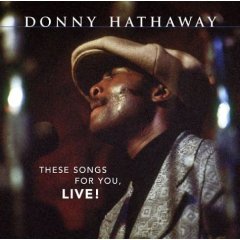 “The Ghetto” by Donny Hathaway; not the original from his album Everything Is Everything nor the famous "edited" handclapping one from Live (recorded in 1972 at the Troubadour in Hollywood and at the Bitter End in New York City) but the long, unedited version from These Songs For You: Live, a posthumous release of previously unavailable (or unedited) concert performances on which Donny and h is band take the song at a faster tempo than the studio version and with definite jazz overtones but maintain the party spirit nonetheless.
The party spirit: when and where we had fun. We danced ‘til we dropped, literally. Squeezing six or seven on a sofa built for four or leaning on the railing on the porch too tired to go another further or even laying postrate on the floor (partly clowning about how tired we are and partially needed a few moments to catch our breath). Oh those days of unadulterated, youthful joy. Man. This twelve-minute version captures that spirit perfectly. You can hear it: hear the audience urging the musicians on, responding early with a thunderous ‘soul clap’ (usually the soul clap was the climax of the song but this time, this time they started where most songs stop), and of course there is the conga solo and then a reprise of the soul clap this time with staccato band accompaniment and a choral breakdown. Man. Can there be any doubt that this “ghetto” was a place of the most intense joy!
Despite all of the negatives—and there were a ton of negatives—for us the essence of the ghetto was that the ghetto was a womb, a place that gave us birth, gave us identity, a place of ultimate satiation in that emotionally we got all that we needed. Or some such. What I know is that in New Orleans today, post-Katrina, the joy of the ghetto, our neighborhoods are gone. Joy still lives here but not like before. Joy has changed. Or something. It’s hard to talk/write about it off the top of one’s head because the truth of the ghetto resides in the core of one’s heart. An articulation of what is lodged there is elusive. Which brings me back to Donny—you hear it in his song. You hear that the ghetto his music celebrates is a beautiful place of love and happiness, of dancing joy and glee-filled shouting.
“The Ghetto” by Donny Hathaway; not the original from his album Everything Is Everything nor the famous "edited" handclapping one from Live (recorded in 1972 at the Troubadour in Hollywood and at the Bitter End in New York City) but the long, unedited version from These Songs For You: Live, a posthumous release of previously unavailable (or unedited) concert performances on which Donny and h is band take the song at a faster tempo than the studio version and with definite jazz overtones but maintain the party spirit nonetheless.
The party spirit: when and where we had fun. We danced ‘til we dropped, literally. Squeezing six or seven on a sofa built for four or leaning on the railing on the porch too tired to go another further or even laying postrate on the floor (partly clowning about how tired we are and partially needed a few moments to catch our breath). Oh those days of unadulterated, youthful joy. Man. This twelve-minute version captures that spirit perfectly. You can hear it: hear the audience urging the musicians on, responding early with a thunderous ‘soul clap’ (usually the soul clap was the climax of the song but this time, this time they started where most songs stop), and of course there is the conga solo and then a reprise of the soul clap this time with staccato band accompaniment and a choral breakdown. Man. Can there be any doubt that this “ghetto” was a place of the most intense joy!
Despite all of the negatives—and there were a ton of negatives—for us the essence of the ghetto was that the ghetto was a womb, a place that gave us birth, gave us identity, a place of ultimate satiation in that emotionally we got all that we needed. Or some such. What I know is that in New Orleans today, post-Katrina, the joy of the ghetto, our neighborhoods are gone. Joy still lives here but not like before. Joy has changed. Or something. It’s hard to talk/write about it off the top of one’s head because the truth of the ghetto resides in the core of one’s heart. An articulation of what is lodged there is elusive. Which brings me back to Donny—you hear it in his song. You hear that the ghetto his music celebrates is a beautiful place of love and happiness, of dancing joy and glee-filled shouting.
 The second song is much, much further away from our day-to-day realities. It’s by a German-based duo, Tok Tok Tok, whom we’ve written about before. On 50 Ways To Leave Your Lover they cover Stevie Wonder’s “I Wish.” I just find it interesting that one sings and the other beatboxes and overdubs a tenor sax; and they make it sound like they are doing their thing. The lyrics are not about Europe. Beatboxing comes specifically from American ghetto streets. What gives? How is it they relate so thoroughly to this?
I think what Tok Tok Tok is digging, and what the whole world digs, is the emotion: ghetto sweetness is a honey that all humanity loves to taste, all humanity can relate to. It's the literal joy of life expressed in all its goodness despite whatever meanness there may be.
And with that, I return into the reminiscent shadows of my own memories and leave you to yours.
—Kalamu ya Salaam
The second song is much, much further away from our day-to-day realities. It’s by a German-based duo, Tok Tok Tok, whom we’ve written about before. On 50 Ways To Leave Your Lover they cover Stevie Wonder’s “I Wish.” I just find it interesting that one sings and the other beatboxes and overdubs a tenor sax; and they make it sound like they are doing their thing. The lyrics are not about Europe. Beatboxing comes specifically from American ghetto streets. What gives? How is it they relate so thoroughly to this?
I think what Tok Tok Tok is digging, and what the whole world digs, is the emotion: ghetto sweetness is a honey that all humanity loves to taste, all humanity can relate to. It's the literal joy of life expressed in all its goodness despite whatever meanness there may be.
And with that, I return into the reminiscent shadows of my own memories and leave you to yours.
—Kalamu ya Salaam
This entry was posted on Monday, June 30th, 2008 at 12:00 am and is filed under Contemporary. You can follow any responses to this entry through the RSS 2.0 feed. You can leave a response, or trackback from your own site.
3 Responses to “LAURYN HILL / “Every Ghetto, Every City””
July 1st, 2008 at 6:09 pm
Mtume/Kalamu, I went to Detroit’s tricentennial celebration in 2001 because and only because Stevie was giving a free concert. Here’s what I wrote for The Times-Picayune…
DETROIT — The young woman to my left was white. She had straight, brown hair that hung down her back. She was dancing, clapping her hands and singing, “Looking back on when I was a little nappy-headed boy . . . ”
Behind her two middle-aged black men danced. I have no reason to believe they were gay, though they were holding hands. One held his hand high above the other’s head allowing his partner to pirouette. They did the bump. Once.
Twice.
Three times.
Then like 4-year-olds in the throes of a sugar rush, they danced independently. Leaping, squatting, bending, shaking their booties, their dancing was all rhythm and no form, the kind of dancing you’d be doing too if you were camped out on the bank of the Detroit River on a pleasant July night at a free Stevie Wonder concert and Stevie Wonder was at that very moment performing his hit “I Wish.”
*********************
I have a colleague at the newspaper who grew up in Montz (small community in St. Charles Parish). She says she and her first-grade classmates made up a dance to “I Wish” and that 30+ years later they still do that same dance every time they hear the song. I haven’t been at a party where they’ve broken it out, but I imagine it’s similar in energy to the guys I saw dancing in Detroit.
Kalamu, what I’ve always liked most about that Donny performance is the anticipation of the crowd. It’s like a rollercoaster that has climbed to its peak. Donny gives the audience a few seconds to tingle, and then that woman yells out, “This is it!!!” And from that point, it’s on. All the way on.
Mtume, like you said, it’s obvious that Lauryn is alluding to Stevie, that there would be no “Every Ghetto, Every City” without “I Wish.” But she still manages to do it in a way that doesn’t sound derivative. Even so, whenever I hear it, I always have a need to hear “I Wish,” too. Thank y’all for pairing them.
July 3rd, 2008 at 10:29 am
Thanks Brothers for this set. In all this reminicing about the past, I have to mention another Stevie Wonder song from Songs in the Key of Life that creates a paradox to this set. That song is Pastime Paradise. The lyrics can be found at the following link: http://steviewonder.free.fr/html/song27.html
Compared to I Wish on a lyrical scale, Pastime Paradise easily wins. The social commentary about living in the "past" (in this case the Jim Crow South) explicitly tells us that we all are at fault if we continue to romance the times of inequality and other ills. For those who never heard it, check out the lyrical snippet below:
They’ve been spending most their lives
Living in a pastime paradise
They’ve been spending most their lives
Living in a pastime paradise
They’ve been wasting most their time
Glorifying days long gone behind
They’ve been wasting most their days
In remembrance of ignorance oldest praise
Tell me who of them will come to be
How many of them are you and me
Now on a musical scale, I Wish is obviously a more bouncy and happier song. However, the complexities needed to create Past Time Paradise were recently explained on a PBS special. Not to quote an old adage, but "The only thing good about the Good Ol’ days is that they are gone." 🙂
Mtume says
I don’t think there’s a paradox there. I think Stevie was talking about different things. "I Wish" is about personal feelings. About wishing for the days of old in a very individual "I wish I was a kid again way." And kids, almost by definition, know nothing about politics or social ills. Kids are just out there doing there kid thing.
"Pastime Paradise" is different. It’s much more of a political record. As Stevie talks about it in "Pastime," the "days long gone behind" are a collective days long gone. It’s about our leaders, our beliefs, our rights and wrongs. That sort of thing. It’s definitely not about one person’s feelings about their own childhood.
One good point you make though, is about the range of Stevie’s music back then. He could make you laugh or cry. He could piss you off, confuse you or have you nodding in agreement. That string of classic albums during the early and mid seventies is simply unbelievable.
July 3rd, 2008 at 11:15 am
Another good duet. Stevie and George Michael.
http://steviewonder.free.fr/mp3/living_for_the_city_with_george_michael.mp3
Leave a Reply
| top |